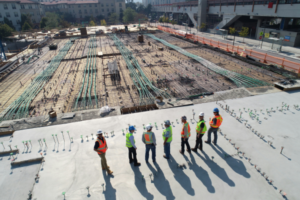Understanding Construction ERP: An Overview
Enterprise Resource Planning (ERP) systems are comprehensive software solutions designed to integrate and manage various aspects of a business’s operations. In the context of the construction industry, Construction ERP systems cater specifically to the unique needs and challenges faced by construction businesses.
At its core, a Construction ERP serves as a centralized platform that enables seamless coordination and communication across different departments and functions within a construction company. It consolidates data from various sources and provides real-time visibility into critical information, allowing for better decision-making and improved overall efficiency.
Construction ERP systems typically encompass a wide range of functionalities and modules that cover key areas of construction business operations, including project management, financial management, resource management, inventory control, procurement, human resources, and more. These modules are interconnected, enabling data to flow seamlessly between them and providing a holistic view of the business.
By leveraging a Construction ERP system, construction companies can streamline their operations, automate manual processes, reduce paperwork, and improve collaboration among various stakeholders, including contractors, subcontractors, suppliers, and clients. The system helps eliminate silos and ensures that everyone involved in a project has access to the latest information, enabling better coordination and timely decision-making.
In addition to operational efficiencies, Construction ERP systems also enhance financial management by providing accurate and up-to-date financial data. They enable companies to track project costs, manage budgets, and generate detailed financial reports, ultimately improving cost control and profitability.
Another crucial aspect of Construction ERP systems is their ability to support project management. They offer features such as scheduling, resource allocation, task tracking, and document management, which help manage projects more effectively. Project managers can monitor progress, identify bottlenecks, and make necessary adjustments to ensure projects are completed on time and within budget.
Furthermore, Construction ERP systems often come with advanced reporting and analytics capabilities, allowing businesses to generate insightful reports, analyze trends, and make data-driven decisions. The availability of real-time data empowers construction companies to identify areas for improvement, optimize resource allocation, and mitigate risks.
In summary, a Construction ERP system provides a comprehensive solution to the unique challenges faced by construction businesses. By integrating various functions and providing real-time visibility, it enhances operational efficiency, improves project management, streamlines financial processes, and enables better decision-making. In the following sections, we will delve deeper into the specific reasons why your construction business needs an ERP system and the key features to look for when choosing the best Construction ERP solution.
Why Your Construction Business Needs an ERP System
Construction businesses face a multitude of challenges, ranging from complex project management to resource allocation and cost control. In such a demanding industry, the implementation of an ERP system specifically designed for construction can provide numerous benefits and address these challenges effectively. In this section, we will explore the key reasons why your construction business needs an ERP system.
Efficiency in Operations
One of the primary reasons to adopt a Construction ERP system is to enhance operational efficiency. Traditional manual processes and disparate systems can lead to inefficiencies, delays, and errors. A Construction ERP streamlines and automates various tasks, eliminating the need for manual data entry, reducing paperwork, and minimizing the risk of human errors. It centralizes information, ensuring that all stakeholders have access to real-time data, and fosters collaboration among different departments and teams. By streamlining operations, a Construction ERP system helps improve productivity, reduce costs, and optimize resource allocation.
Real-Time Data Access
Timely access to accurate and up-to-date data is essential for effective decision-making and project management in the construction industry. A Construction ERP system provides real-time visibility into critical information, such as project status, resource availability, financial data, and inventory levels. This enables project managers, executives, and other stakeholders to make informed decisions based on current and accurate data. Real-time data access also facilitates proactive problem-solving, as issues can be identified and addressed promptly, minimizing potential delays or cost overruns.
Project Management and Control
Managing construction projects involves juggling multiple tasks, coordinating resources, and ensuring that projects are completed on time and within budget. A Construction ERP system offers comprehensive project management capabilities, including features such as scheduling, task tracking, resource allocation, and document management. These tools enable project managers to plan and monitor project progress, identify potential bottlenecks, and make necessary adjustments to keep projects on track. With centralized project data and real-time visibility, Construction ERP systems empower project managers to exercise better control over their projects, resulting in improved efficiency and successful project delivery.
Cost Management
Cost control is a critical aspect of construction business operations. A Construction ERP system provides robust financial management features that enable accurate cost tracking, budget management, and expense control. By automating financial processes and generating detailed reports, the system helps construction companies monitor project costs, identify cost variances, and take corrective actions. With better cost management, businesses can optimize their profitability, avoid unnecessary expenses, and make informed decisions about their projects and investments.
In conclusion, a Construction ERP system offers numerous benefits for construction businesses. It enhances operational efficiency, provides real-time data access for informed decision-making, facilitates effective project management and control, and improves cost management. By implementing a Construction ERP system, your construction business can streamline operations, optimize resource allocation, and achieve greater success in a highly competitive industry. In the following sections, we will delve into the key features to look for when selecting a Construction ERP system that best suits your business needs.
Key Features to Look for in a Construction ERP
When selecting a Construction ERP system for your business, it is crucial to consider the key features that will meet your specific requirements and help address the challenges faced by the construction industry. In this section, we will explore the essential features to look for when choosing a Construction ERP system.
Project Management Capabilities
A robust Construction ERP should offer comprehensive project management capabilities. This includes features such as project scheduling, task tracking, resource allocation, and collaboration tools. The system should allow project managers to easily create and manage project schedules, assign tasks to team members, track progress, and monitor resource utilization. Additionally, the ability to generate reports and dashboards that provide a holistic view of project status and performance is essential for effective project management.
Financial Management Features
Construction businesses rely on accurate financial management to maintain profitability and control costs. A Construction ERP should have robust financial management features, including budgeting, cost tracking, invoicing, and expense management. The system should allow for accurate tracking of project costs, enable efficient budget management, and provide tools for generating accurate and timely invoices. It should also support integration with accounting systems for seamless financial data management.
Resource and Inventory Management
Efficient resource and inventory management is vital for construction businesses. Look for a Construction ERP that offers features such as resource planning, equipment tracking, and inventory control. The system should provide tools to manage resources effectively, including labor, equipment, and materials, ensuring optimal utilization and minimizing downtime. It should also include inventory management capabilities to track and control materials, streamline procurement processes, and avoid stockouts or overstocking.
Mobile Access and User-Friendly Interface
In today’s mobile-driven world, it is crucial for a Construction ERP system to offer mobile access and a user-friendly interface. Construction projects often require on-site collaboration and real-time data access. The system should have mobile capabilities that allow field staff, project managers, and executives to access project information, update progress, and collaborate on tasks from anywhere, using their mobile devices. Additionally, the user interface should be intuitive and easy to navigate, ensuring widespread user adoption and minimizing training requirements.
Integration Capabilities
A Construction ERP system should be able to integrate with other software and systems commonly used in the construction industry, such as estimating software, document management systems, and scheduling tools. Seamless integration allows for the exchange of data between different systems, eliminating duplicate data entry and ensuring data consistency across the organization. It also enables automated workflows and improves overall efficiency.
In summary, when selecting a Construction ERP system, it is important to consider the key features that will support your construction business’s specific needs. Look for a system with robust project management capabilities, comprehensive financial management features, efficient resource and inventory management tools, mobile access, a user-friendly interface, and integration capabilities. By choosing a Construction ERP system with these essential features, you can streamline your operations, improve efficiency, and achieve greater success in the construction industry. In the next section, we will explore best practices for implementing a Construction ERP system in your business.
Implementing a Construction ERP: Best Practices
Implementing a Construction ERP system is a significant endeavor that requires careful planning and execution. To ensure a successful implementation, it is important to follow best practices and consider key factors that can impact the outcome. In this section, we will discuss the best practices for implementing a Construction ERP system in your business.
Getting Stakeholder Buy-In
Before embarking on the implementation process, it is crucial to get buy-in from key stakeholders within your organization. This includes executives, department heads, project managers, and end-users who will be directly impacted by the new system. Communicate the benefits of the Construction ERP system and how it aligns with the organization’s goals and objectives. Address any concerns or resistance and ensure that stakeholders understand the value and potential impact of the system on their day-to-day operations.
Choosing the Right Implementation Partner
Selecting the right implementation partner is vital for the success of your Construction ERP system. Look for a vendor with experience in the construction industry and a proven track record of successful implementations. Evaluate their expertise, support services, and their ability to understand and meet your specific business requirements. Request references and speak to other companies who have implemented the same ERP system to gain insights into their experiences. A strong partnership with the implementation partner will ensure smooth implementation and ongoing support.
Defining Clear Objectives and Scope
Clearly define your objectives and scope of the implementation project. Identify the specific areas of your business that the Construction ERP system will address, such as project management, financial management, or resource management. Set realistic goals and expectations for what the system will achieve. By having clear objectives and scope, you can focus on the necessary customization, configuration, and training required to meet your specific business needs.
Adequate Training and User Adoption
Training and user adoption are critical to the success of any ERP implementation. Ensure that your team receives comprehensive training on how to use the Construction ERP system effectively. This includes training sessions, user manuals, and ongoing support to address any questions or issues that may arise. Encourage user adoption by highlighting the benefits of the system and providing opportunities for users to provide feedback and suggestions for improvement. By investing in training and user adoption, you can maximize the benefits of the system and ensure a smooth transition.
Continuous Evaluation and Improvement
An ERP implementation is not a one-time event but an ongoing process. Continuously evaluate the performance and effectiveness of the system to identify areas for improvement. Regularly review key performance indicators (KPIs) and metrics to measure the impact of the Construction ERP system on your business operations. Seek feedback from users and stakeholders to identify any pain points or areas where the system can be enhanced. This continuous evaluation and improvement will help you optimize the system’s performance and ensure its long-term success.
In conclusion, implementing a Construction ERP system requires careful planning and adherence to best practices. By getting stakeholder buy-in, choosing the right implementation partner, defining clear objectives and scope, providing adequate training and user adoption, and continuously evaluating and improving the system, you can ensure a successful implementation that maximizes the benefits of the Construction ERP system for your business. In the next section, we will conclude this comprehensive guide by summarizing the key points discussed and highlighting the importance of leveraging a Construction ERP system in the construction industry.
Conclusion: Making the Most of Your Construction ERP
In today’s competitive construction industry, leveraging a Construction ERP system can significantly impact the success and growth of your business. By streamlining operations, improving project management, enhancing cost control, and providing real-time data access, a Construction ERP system empowers construction companies to stay ahead of the curve and thrive in a challenging market.
Throughout this comprehensive guide, we have explored the importance of understanding Construction ERP systems and why your construction business needs one. We have discussed the key features to look for when selecting a Construction ERP system, including project management capabilities, financial management features, resource and inventory management, mobile access, and integration capabilities.
We have also delved into the top Construction ERP solutions available in the market, providing a comparison of their features, pros, and cons. This information will help you make an informed decision based on your specific business needs and requirements.
Furthermore, we have discussed best practices for implementing a Construction ERP system, including getting stakeholder buy-in, choosing the right implementation partner, defining clear objectives and scope, providing adequate training and user adoption, and continuously evaluating and improving the system.
By following these best practices and leveraging the power of a Construction ERP system, your construction business can achieve enhanced operational efficiency, improved project management, streamlined financial processes, and better cost control. You can make data-driven decisions, optimize resource allocation, and ultimately drive sustainable growth and profitability.
In conclusion, investing in a Construction ERP system is a strategic move that can transform your construction business operations and help you stay ahead of the competition. With the right system in place, you can overcome challenges, maximize efficiency, and achieve success in the ever-evolving construction industry.
Thank you for joining us on this comprehensive guide to the best Construction ERP practices. We hope that the information provided has been valuable and will guide you towards making the right decisions for your construction business. Remember, the key to success lies in embracing technology, optimizing processes, and leveraging the power of a robust Construction ERP system. Good luck on your journey towards success!




